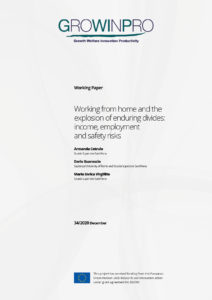Why are there so many non-teleworkable occupations? Is teleworking only a matter of ICT usage or does it also reflect the division of labour and the underlying hierarchical layers inside organizations? What does it happen to those workers not able to telework in terms of socio-economic risks, and how does the gender dimension interact with risk stratification? Hereby, we intend to shed light on these questions using a detailed integrated dataset at individual and occupational level (Indagine Campionaria delle Professioni, Indagine delle Forze di Lavoro and Inail archive) which provides information on different nature of risks (income, employment and safety). Our results entail that, first, class attributes strongly influence the chance of working from home, second, those individuals who are not able to perform their work remotely are more exposed to transition to unemployment, to earn low wages, and to safety and health risks, third, being woman and employed with a temporary contract significantly amplify risk stratification.

